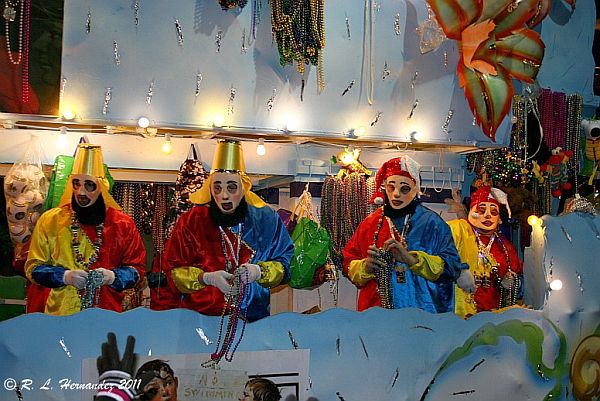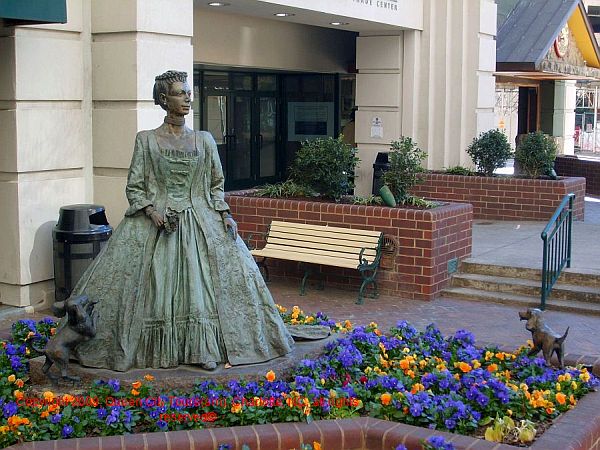I was bursting with excitement when we decided to publish an article on
Mardi Gras because that event has been on my mind for many years and is currently high on my bucket list along with
Carnival in
Trinidad and Tobago. The closest that I have gotten to
Mardi Gras was in
1984 when I stopped through
New Orleans (Nawlins) during the
World's Fair as part of a 24-hour lay over on the
Amtrak. That is when I decided to catch a taxi cab onto
Bourbon Street and take a look around. It was one of the fun nest, wildest, craziest times of my life as I saw things there that would cause even the most ardent traveler to blush. Things that go way beyond the scope of this G rated article. As the saying goes what goes on on
Bourbon Street stays on
Bourbon Street; or is that
Las Vegas? Smile!
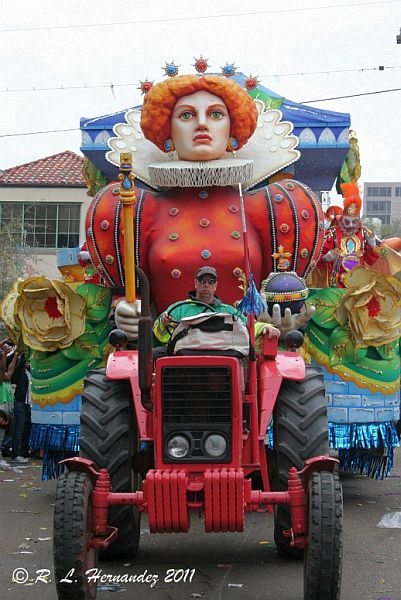
Our goal with this article was to actually go behind the scenes of
Mardi Gras to give you an idea of what it takes to successfully pull off such a world-renowned event year after year; so we contacted the public relations person there -
Ms. Bobbi Mannino - and she was indeed a pleasure to work with and very efficient at her job. Pay raise time right? She quickly put me in touch with a fellow by the name of
Mr. Tibideaux; just kidding, I like that name, actually it was
Warren Serignet who is a
Parade Coordinator for
Mardi Gras. I know, I know; when most of us think of that event a parade is the last thing on our minds right? But as I learned during my research and interview with
Mr. Serignet it is the parades that kick things off leading up to the big day which is
Fat Tuesday - this year it is on
Tuesday March 1, 2022. They had
58 area parades lined up starting on
Saturday February 4, 2012, and culminating on
Tuesday February 21, 2012 (Fat Tuesday).
Coach Serignet (As he likes to be called) coordinates six of these fabulous tributes to
New Orleans and its rich history.
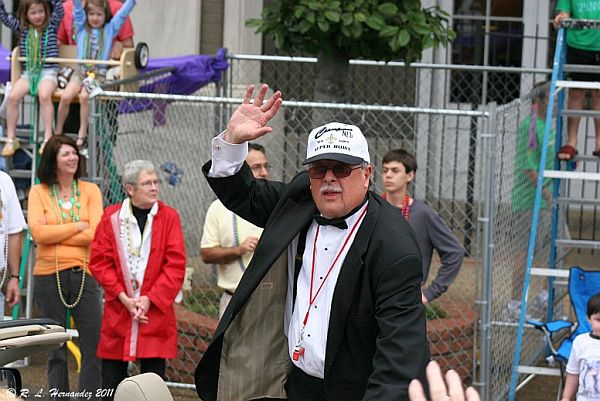 Jay:
Jay: How do you pronounce your last name?
Serignet: It's pronounced like "Serenade" and is a good ole' fashioned French name!
Jay: What is your official title; and your duties and responsibilities?
Serignet: I am the Parade Coordinator for
Pontchartrain (Saturday 02/11/2012 @ 2 PM),
Babylon (Thursday 02/16/2012 @ 5:45 PM),
Chaos (Thursday 02/16/2012 @ 6:30 PM),
Tucks (Saturday 02/18/2012 @ 12 PM),
Okeanos (Sunday 02/19/2012 @ 11 AM), and
Napolean (Sun. 02/19/2012 @ 5:30 PM) and it is my job to get every unit in a parade based on the clubs budget.
Jay: How long have you been a Parade Coordinator?
Serignet: I started in 1980 with a jazz band.
Jay: Were you born in New Orleans?
Serignet: Yes but I grew up not too far from here in Davant, Louisiana.
Jay: What is your educational background?
Serignet: I earned my Bachelor's Degree at Southeastern Louisiana College in Hammond, Louisiana, in physical education/health with a minor in social studies. I played basketball and baseball in High School.
Jay: What is your full-time job?
Serignet: I am a disciplinary at C. F. Rowley Alternative Shool in Chalmette, Louisiana, and have coached middle school girls' basketball, volleyball, softball, and track at East Baton Rouge Parish.
Jay: What do you like most about your job?
Serignet: I like putting it [The parades] all together; I have had green, purple, and gold in my blood since I was 13. I also get to meet people from every walk of life and get to go to Mardi Gras parties and balls and it does not cost me anything. And after the parades are done I get compliments and it's just like winning a game with my teams.
Jay: Any dislikes?
Serignet: I sometimes don't like dealing with certain band directors who call me for all this information and I never hear from them again. They should let me know if they went with someone else rather than leave me hanging.
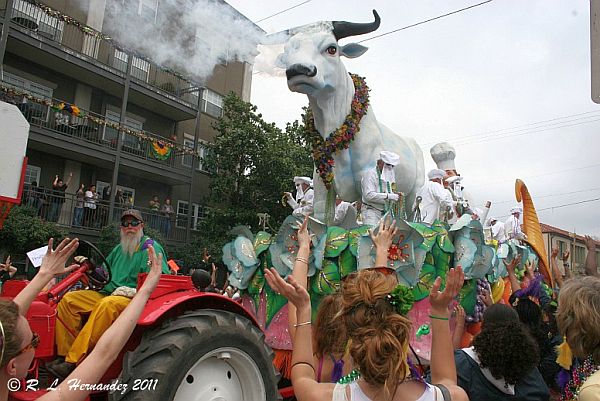
Jay: What has been [to date] your most memorable moment while doing your job as parade coordinator?
Serignet: It was after Katrina [2005], the parades wasn't as big as they used to be and these people from France came down and covered the Krewe of Pontchartrain. I thought they were pulling my leg at first but they did come to my house [as promised] and did some filming while we were living in a FEMA trailer. They also took pictures of the floats and later sent me a DVD that aired in France.
Jay: What is a Krewe and why is it spelled that way?
Serignet: Krewe is a generic term for all carnival organizations. The first one was the Mystic Krewe of Comus in 1854 and it's spelled that way to give the word an Old English flavor.
Jay: What does it take to become a part of a Krewe?
Serignet: It's all about money! You have to get members to join your Krewe and each one must pay $900 to $1,200. With that you get costumes and party invites but you have to pay extra for your float, beads, and stuffed animals to throw during the parade. Some Krewes require a minimum gross of beads and that you purchase directly through them, while others allow you to get your own [say at the dollar store]. They also have to get float builder [liability] insurance which is very expensive. This is just in case someone gets run over or someone falls off the float which rarely happens but it did a couple of years ago.
Jay: What do the Krewes get out of the parade, can they advertise?
Serignet: You cannot advertise in Orleans Parish except the Jefferson Parish. Every Krewe [organization] has a theme that goes with their float. Also, most people just like the idea of being a part a club.
Jay: How much is a typical budget for a parade and how are you compensated?
Serignet: It can be as much as $30,000 and I get a commission. Every Parade has a King and Queen and that can cost $700 to $800 on the low side and $4,000 to $5,000 on the high side. Parades are non-profit so all the money has to go back into the parade.
Jay: What is your favorite Krewe?
Serignet: Napolean, I have been with them for 35 years.


 Our goal with this article was to actually go behind the scenes of Mardi Gras to give you an idea of what it takes to successfully pull off such a world-renowned event year after year; so we contacted the public relations person there - Ms. Bobbi Mannino - and she was indeed a pleasure to work with and very efficient at her job. Pay raise time right? She quickly put me in touch with a fellow by the name of Mr. Tibideaux; just kidding, I like that name, actually it was Warren Serignet who is a Parade Coordinator for Mardi Gras. I know, I know; when most of us think of that event a parade is the last thing on our minds right? But as I learned during my research and interview with Mr. Serignet it is the parades that kick things off leading up to the big day which is Fat Tuesday - this year it is on Tuesday March 1, 2022. They had 58 area parades lined up starting on Saturday February 4, 2012, and culminating on Tuesday February 21, 2012 (Fat Tuesday). Coach Serignet (As he likes to be called) coordinates six of these fabulous tributes to New Orleans and its rich history.
Our goal with this article was to actually go behind the scenes of Mardi Gras to give you an idea of what it takes to successfully pull off such a world-renowned event year after year; so we contacted the public relations person there - Ms. Bobbi Mannino - and she was indeed a pleasure to work with and very efficient at her job. Pay raise time right? She quickly put me in touch with a fellow by the name of Mr. Tibideaux; just kidding, I like that name, actually it was Warren Serignet who is a Parade Coordinator for Mardi Gras. I know, I know; when most of us think of that event a parade is the last thing on our minds right? But as I learned during my research and interview with Mr. Serignet it is the parades that kick things off leading up to the big day which is Fat Tuesday - this year it is on Tuesday March 1, 2022. They had 58 area parades lined up starting on Saturday February 4, 2012, and culminating on Tuesday February 21, 2012 (Fat Tuesday). Coach Serignet (As he likes to be called) coordinates six of these fabulous tributes to New Orleans and its rich history. Jay: How do you pronounce your last name?
Jay: How do you pronounce your last name? Jay: What has been [to date] your most memorable moment while doing your job as parade coordinator?
Jay: What has been [to date] your most memorable moment while doing your job as parade coordinator?